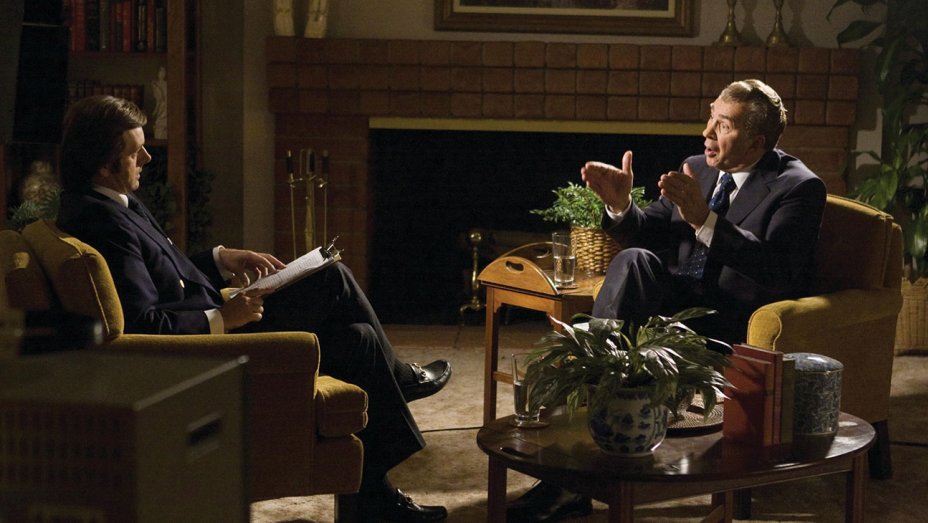‘Frost/Nixon‘ is a 2008 movie that revisits a particularly crucial moment in American history: the Watergate scandal. However, the film does not tell the story of the Watergate scandal. Instead, it is set sometime after that. Despite focusing on a single series of interviews as its focal point, ‘Frost/Nixon’ manages to maintain the tension rather superbly. The well-made film was nominated for five Academy Awards including Best Picture, Best Director, and Best Actor.
Michael Sheen plays the titular character of David Frost while Frank Langella plays the character of Richard Nixon. Other cast members include Kevin Bacon, Rebecca Hall, Toby Jones, and Sam Rockwell.
Frost/Nixon Plot Summary
Nixon resigns after the Watergate scandal before he can be impeached. However, he does not apologize for the crimes that he had committed. Furthermore, President Ford grants Nixon a presidential pardon, angering the public since they feel like they do not have enough closure.
A British talk show host named David Frost seeks permission to interview Nixon. Nixon decides that it would be a good way to earn some money. Plus, he believes that he can easily take on David Frost and won’t get cornered by him since he is not a “real journalist.” He agrees to grant Frost exclusive interview rights for $600,000. When Nixon meets Frost, he likes Frost’s shoes. However, his chief of staff thinks they are too feminine.
Frost finds it tough to sell the interview to any network, forcing him to pay for its costs from his own pocket. He hires Bob Zelnick and James Reston Jr. to research for the interview. In the first few sessions, Nixon has the upper hand. Frost’s own team starts to put pressure on him.
Before the final session, Nixon calls Frost late at night. He tells Frost how both of them are from humble backgrounds and are thus always motivated to be more successful. He tells Frost how difficult it is for people like them since people from more fortunate backgrounds are always ready to knock them down.
In the final session, Frost manages to corner Nixon with evidence that Nixon had not been aware of. He manages to elicit an apology from him. Frost becomes incredibly popular after that. Before he leaves the United States, Nixon invites Frost to his house. Frost gifts him a pair of shoes similar to his. It is revealed that Frost went on to become more successful. Nixon, with the pair of shoes at his side, stares at the sea.
Frost/Nixon Ending Explained:
‘Frost/Nixon’ ends with Nixon staring at the sea, with the pair of shoes gifted by Frost at his side. He appears to be melancholic. Several viewers would have wondered what the ending signifies. Well, according to me, it serves as the conclusion to an attempted, humanistic portrayal of Richard Nixon.
To be clearer, ‘Frost/Nixon’ in no way glorifies Richard Nixon. In fact, it displays all his flaws and crimes quite clearly. But ‘Frost/Nixon’ also attempts to stray away from showing him as an evil, villainous figure. The movie tries to paint a humanistic image of the former President and that proves to be rather touching.
Towards the end, Nixon tells Frost how he does not remember calling Frost. Frost tells him that they talked about “cheeseburgers” and nothing important. Nixon probably forgets that he called Frost due to his age. Moreover, he is depicted to be in a rather vulnerable state when he calls Frost. This is when he opens up the most about his struggles. He tells Frost about coming from a humble background and always having to struggle and avoid being knocked down.
That conversation shows how Nixon was rather obsessed with being successful. To put it in better words, he was obsessed with portraying his success and never being “knocked down.” He was a man whose past had made him tie his self-worth with his work and others’ opinions. Hence, the interview going poorly certainly has a terrible impact on him. In fact, the reason he agrees to do the interview is that he wishes to change the public perception.
Coming to the end, the above trait of Nixon is captured poetically, thanks to the shoes next to his side. He is depicted to have actually liked the shoes that Frost was wearing when he first saw him. However, when his chief of staff says that he thinks they are too feminine, he agrees with him because of his habit of bowing down to others’ opinions. When he comes to the interview, he wears laced shoes: something approved by Brennan. Hence, the final scene portrays Nixon’s obsession with fitting in.
This sentiment is further confirmed by the text at the end of the movie: “Richard Nixon published his 100o page memoirs in 1978 but never escaped controversy. He traveled again to China and Russia, though only as a private citizen. He remained largely absent from official state functions until his death, of a stroke, in 1994.
Read More: Best Movies About Presidents

